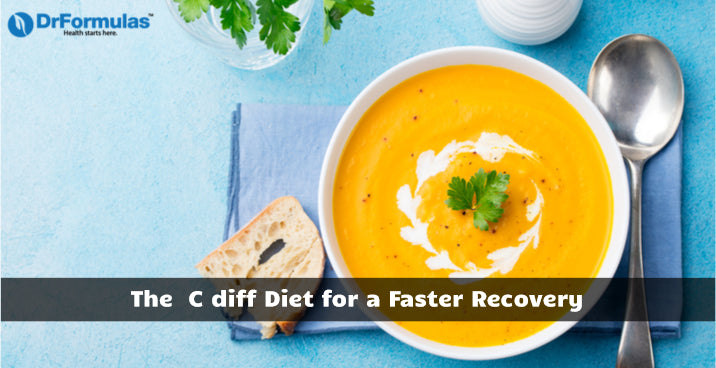
If you have a C diff infection or have had a C diff infection, then you will most likely know what it is. If not please read our article on what C diff infections are.
How Is C diff Treated?
Many medical professionals will start for C diff by prescribing the appropriate antibiotic. The antibiotic used depends on whether it is your first, second, or subsequent reinfection.
If you have had reoccurring C. diff infections, your doctor may consider a fecal microbiota transplant from a screened donor.
The good news about C diff is that researchers are making great progress in the treatment of C diff. Researchers have started to combine cultured intestinal bacteria to make probiotic pills to take for a C diff infection.
A cultured intestinal bacteria concoction 33 types of intestinal bacteria isolated from a healthy donor was able to cure C diff in two patients who failed antibiotic therapy multiple times.1 The cultured intestinal bacteria was present in 25% of the patients’ gut microbiome 6 months later.
Best Diet for C diff
If a fecal microbiota transplant doesn't sound appealing to you there are dietary changes you can make to help support your gut microbiome in its fight against C diff.
1. Electrolytes
During a C diff infection it is difficult to consume food because of the diarrhea. We recommend a liquid diet using electrolyte-enhanced water solution to maintain hydration. Other sources of electrolytes and minerals include:
- soup broth
- coconut water
- non-sweetened sports drinks
- pedialyte
2. Bland Foods
People with diarrhea should eat bland foods because spicy foods and more complex ones can irritate the gut.
Bland foods include:
- hot cereals, oatmeal, cream of wheat, rice porridge
- bananas
- applesauce
- white rice
- bread
- boiled potatoes
- plain crackers
Foods to Avoid
- Spicy foods
- Fried foods
- High fiber foods
- Sugary foods including ones with artificial sweeteners
- Gas producing foods: cabbage, broccoli, cauliflower, onions and garlic, raw vegetables
- Most processed, packaged food
- Citrus foods
- Fatty meats including sardines, pork, veal
- Dairy products
3. Liquids
Liquids are critical for recovery. People should drink plenty of water throughout the day and an additional cup of water after every loose bowl movement. Drinking lots of water helps prevent dehydration and flush toxins out of the body.
Drinks to Avoid
Caffeinated beverages such as coffee, tea, and soda pop should be avoided because they contain caffeine which can worsen dehydration during C diff.
4. Probiotic Enriched Foods
As discussed earlier, C diff is a disease that results from the disruption of natural flora and the lack of probiotics. Kefir is one of the most powerful food sources of probiotics. Compared to regular yogurts, kefir has many more probiotic strains and a higher dose of probiotics than normal yogurt.
5. Probiotics Supplement
Fecal transplant remains the only method providing lasting transplantation of probiotics into individuals with C diff. If these clinically isolated probiotics have a role in the treatment of C diff then what is the role of over-the-counter probiotics?
Probiotics come in many different strengths and strains. According to a meta study published in the Annals of Internal Medicine probiotics reduce the occurrence of C diff by 66%.2
Probiotics for C diff: The probiotic strains found to have reduce the occurrence of C diff when administered with an antibiotic include: Lactobacillus acidophilus with Lactobacillus casei, Saccharomyces boulardii, L. rhamnosus, and other species.
Theoretically, if one probiotic works to reduce C diff then a diverse or multi-probiotic product would work better. The data seems to reflect this as the patients that received a mixture of L. acidophilus and L. casei had a lower chance of developing C diff.
Conclusion
In conclusion, C diff is a debilitating disease brought about by antibiotic use. Antibiotics wipe out the normal gut microbes that normally keep C diff numbers in check. By using a combination of probiotics, the right probiotic-rich foods, and staying hydrated with an electrolyte solution you should be able to support your fight against C diff.
Read next: How Long is C diff Contagious For?
Sources:
- https://microbiomejournal.biomedcentral.com/articles/10.1186/2049-2618-1-3
- https://annals.org/aim/article-abstract/1390418/probiotics-prevention-clostridium-difficile-associated-diarrhea-systematic-review-meta-analysis


